AWM41 1056 - [Nurses Narratives] Mrs McHardie White - Part 1
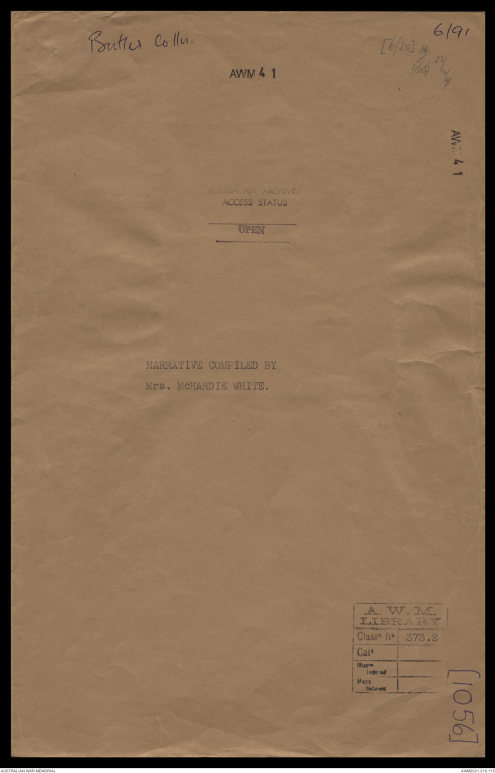
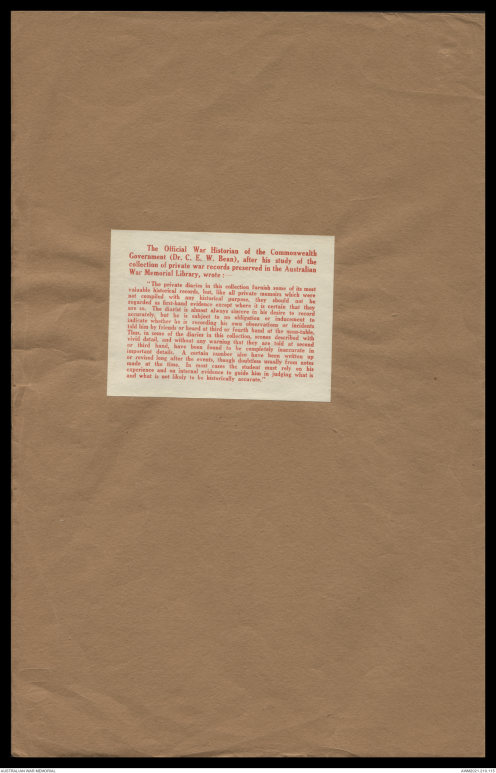
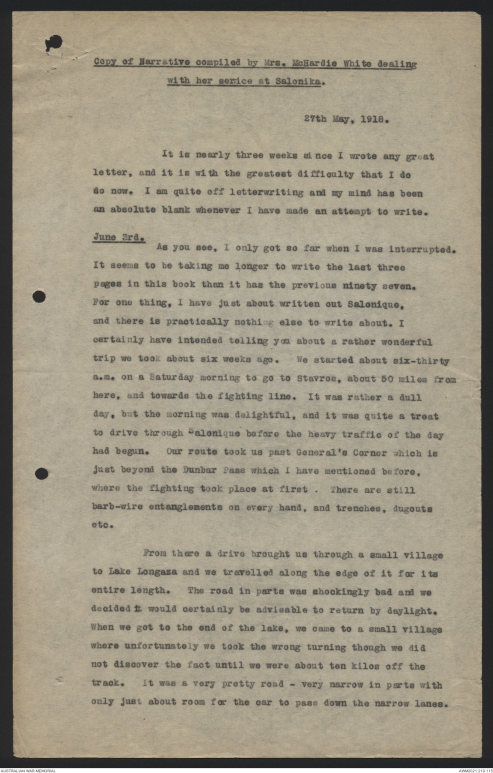
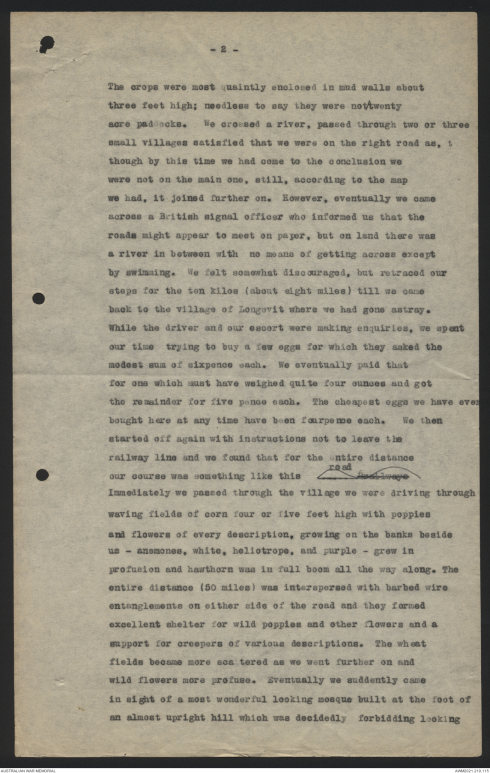
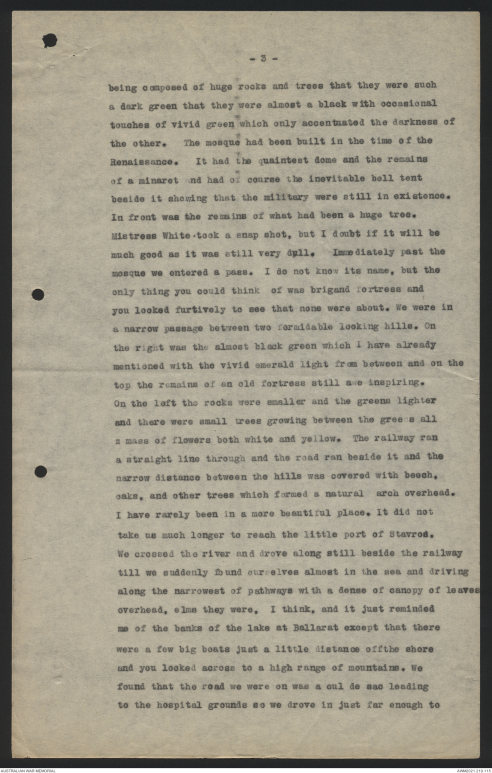
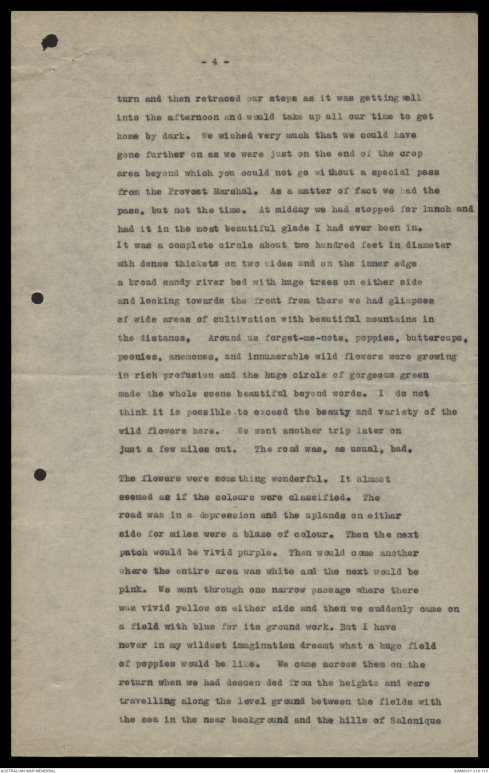
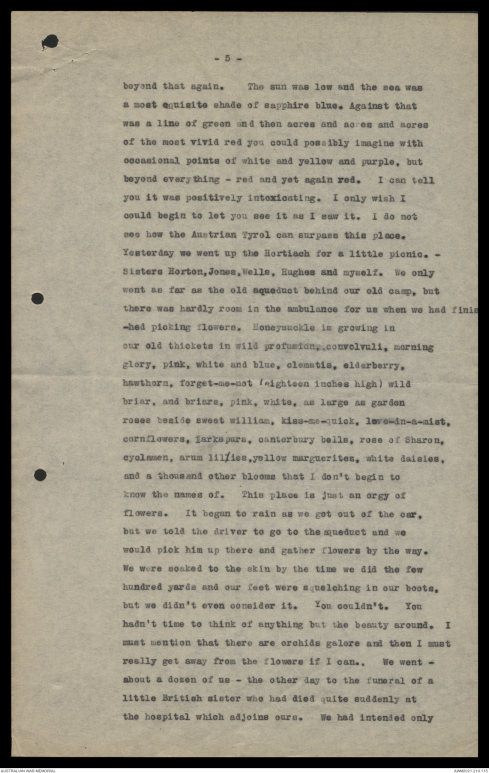
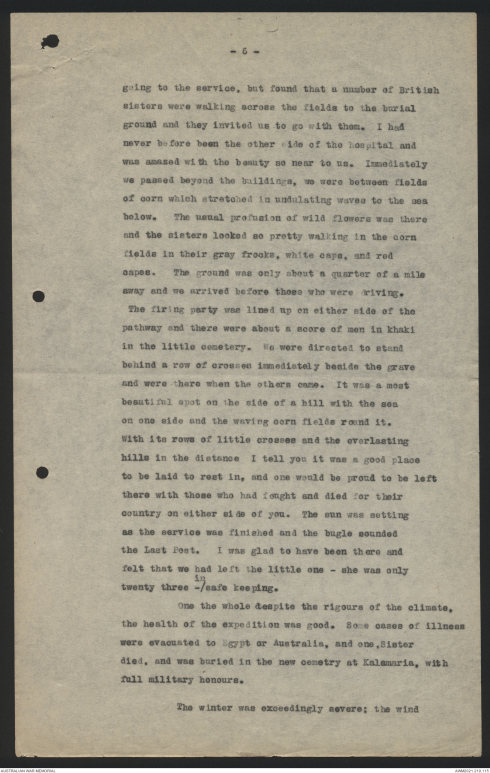
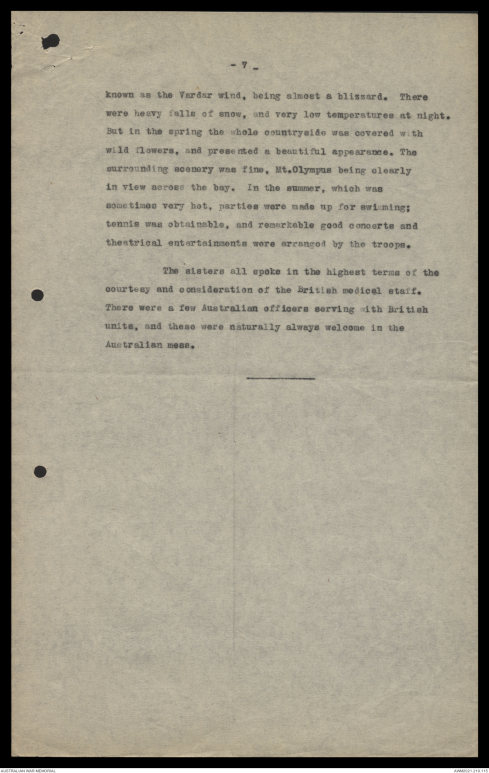
Butler Colln
6/91
6/?
AWM 41
AWM 41
ACCESS STATUS
OPEN
NARRATIVE COMPILED BY
Mrs. McHARDIE WHITE.
A. W. M.
LIBRARY
Classn No 373.2
(1056)
The Official War Historian of the Commonwealth
Government (Dr. C. E. W. Bean), after his study of the
collection of private war records preserved in the Australian
War Memorial Library, wrote:
"The private diaries in this collection furnish some of its most
valuable historical records, but, like all private memoirs which were
not compiled with any historical purpose, they should not be
regarded as first-hand evidence except where it is certain that they
are so. The diarist is almost always sincere in his desire to record
accurately, but he is subject to no obligation or inducement to
indicate whether he is recording his own observations or incidents
told to him by friends or heard at third or fourth hand at the mess-table.
Thus, in some of the diaries in this collection, scenes described with
vivid detail, and without warning that they are told at second
or third hand, have been found to be completely inaccurate in
important details. A certain number also have been written up
or revised long after the events, though doubtless usually from notes
made at the time. In most cases the student must rely on his
experience and on internal evidence to guide him in judging what is
and what is not likely to be historically accurate."
Copy of Narrative compiled by Mrs. McHardie White dealing
with her service at Salonika.
27th May, 1918.
It is nearly three weeks since I wrote any great
letter, and it is with the greatest difficulty that I do
so now. I am quite off letterwriting and my mind has been
an absolute blank whenever I have made an attempt to write.
June 3rd.
As you see, I only got so far when I was interrupted.
It seems to be taking no longer to write the last three
pages in this book than it has the previous ninety seven.
For one thing, I have just about written out Salonique,
and there is practically nothing else to write about. I
certainly have intended telling you about a rather wonderful
trip we took about six weeks ago. We started about six-thirty
a.m. on a Saturday morning to go to Stavros, about 50 miles from
here. and towards the firing line. It was rather a dull
day, but the morning was delightful, and it was quite a treat
to drive through Salonique before the heavy traffic of the day
had begun. Our route took us past General's Corner which is
just beyond the Dunbar Pass which I mentioned before,
where the fighting took place at first. There are still
barb-wire entanglements on every hand, and trenches, dugouts
etc.
From there a drive brought us through a small village
to Lake Longaza and we travelled along the edge of it for its
entire length. The road in parts was shockingly bad and we
decided it would certainly be advisable to return by daylight.
When we got to the end of the lake, we came to a small village
where unfortunately we took the wrong turning though we did
not discover the fact until we were about ten kilos off the
track. It was a very pretty road - very narrow in parts with
only just about room for the car to pass down the narrow lanes.
- 2 -
The crops were most quaintly enclosed in mud walls about
three feet high; needless to say they were not/twenty
acre paddocks. We crossed a river, passed through two or three
small villages satisfied that we were on the right road as,
though by this time we had come to the conclusion we
were not on the main one, still, according to the map
we had, it joined further on. However, eventually we came
across a British signal officer who informed us that the
roads might appear to meet on paper, but on land there was
a river in between with no means of getting across except
by swimming. We felt somewhat discouraged, but retraced our
steps for the 10 kilos (about 8 miles) till we came
back to the village of Longavit where we had gone astray.
While the driver and our escort were making enquiries, we spent
our time trying to buy a few eggs for which they asked the
modest sum of sixpence each. We eventually paid that
for one which must have weighed quite four ounces and got
the remainder for five pence each. The cheapest eggs we have ever
bought here at any time have been fourpence each. We then
started off again with instructions not to leave the
railway line and we found that for the entire distance
our course was something like this
Hand drawn diagram – see original
Immediately we passed through the village we were driving through
waving fields of corn four or five feet high with poppies
and flowers of every description, growing on the banks beside
us- anemones, white, heliotrope, and purple - grew in
profusion and hawthorn was in full boom all the way along. The
entire distance (50 miles) was interspersed with barbed wire
entanglements on either side of the road and they formed
excellent shelter for wild poppies and other flowers and a
support for creepers of various descriptions. The wheat
fields became more sca tered as we went further on and
wild flowers more profuse. Eventually we suddenly came
in sight of a most wonderful looking mosque built at the foot of
an almost upright hill which was decidedly forbidding looking
- 3 -
being composed of huge rocks and trees they they were such
a dark green that they were almost a black with occasional
touches of vivid green which only accentuated the darkness of
the other. The mosque had been built in the time of the
Renaissance. It had the quaintest dome and the remains
of a minaret and had of course the inevitable bell tent
beside it showing that the military were still in existence.
In front was the remains of what had been a huge tree.
Mistress White took a snapshot, but I doubt if it will be
much good as it was still very dull. Immediately past the
mosque we entered a pass. I do not know its name, but the
only thing you could think of was brigand fortress and
you looked furtively to see that none were about. We were in
a narrow passage between two formidable looking hills. On
the right was the almost black green which I have already
mentioned with the vivid emerald light from between and on the
top the remains of an old fortress still awe inspiring.
On the left the rocks were smaller and the greens lighter
and there were small trees growing between the greens all
a mass of flowers both white and yellow. The railway ran
a straight line through and the road ran beside it and the
narrow distance between the hills was covered with beech,
oaks, and other trees which formed a natural arch overhead.
I have rarely been in a more beautiful place. It did not
take us much longer to reach the little port of Stavros.
We crossed the river and drove along still beside the railway
till we suddenly found ourselves almost in the sea and driving
along the narrowest of pathways with a dense canopy of leaves
overhead, elms they were, I think, and it just reminded
me of the banks of the lake at Ballarat except that there
were a few big boats just a little distance offthe shore
and you looked across to a high range of mountains. We
found that the road we were on was a cul de sac leading
to the hospital grounds so we drove in just far enough to
- 4 -
turn and then retraced our steps as it was getting well
into the afternoon and would take up all our time to get
home by dark. We wished very much that we could have
gone further on as we were just on the end of the crop
area beyond which you could not go without a special pass
from the Provost Marshal. As a matter of fact we had the
pass, but not the time. At midday we had stopped for lunch and
had it in the most beautiful glade I had ever been in.
It was a complete circle about two hundred feet in diameter
with dense thickets on two sides and on the inner edge
a broad sandy river bed with huge trees on either side
and looking towards the front from there we had glimpses
of wide areas of cultivation with beautiful mountains in
the distance. Around us forget-me-nots, poppies, buttercups,
peonies, anemones, and innumerable wild flowers were growing
in rich profusion and the huge circle of gorgeous green
made the whole scene beautiful beyond words. I do not
think it is possible to exceed the beauty and variety of the
wild flowers here. We went another trip later on
just a few miles out. The road was, as usual, bad.
The flowers were something wonderful. It almost
seemed as it the colours were classified. The
road was in a depression and the uplands on either
side for miles were a blaze of colour. Then the next
patch would be vivid purple. Then would come another
where the entire area was white and the next would be
pink. We went through one narrow passage where there
was vivid yellow on either side and then we suddenly came on
a field with blue for its ground work. But I have
never in my wildest imagination dreamt what a huge field
of poppies would be like. We came across them on the
return when we had descen ded from the heights and were
travelling along the level ground between the fields with
the sea in the near background and the hills of Salonique
- 5 -
beyond that again. The sun was low and the sea was
a most exquisite shade of sapphire blue. Against that
was a line of green and then acres and acres and acres
of the most vivid red you could possibly imagine with
occasional points of white and yellow and purple, but
beyond everything - red and yet again red. I can tell
you it was positively intoxicating. I only wish I
could begin to let you see it as I saw it. I do not
see how the Austrian Tyrol can surpass this place.
Yesterday we went up the Hortiach for a little picnic. -
Sisters Horton,Jones,Wells, Hughes and myself. We only
went as far as the old aqueduct behind our old camp, but
there was hardly room in the ambulance for us when we had finished
picking flowers. Honeysuckle is growing in
our old thickets in wild profusion,convolvuli, morning
glory, pink, white and blue, clematis, elderberry
hawthorn, forget-me-not (eighteen inches high) wild
briar, and briars, pink, white, as large as garden
roses beside sweet william, kiss-me-quick, love-in-a-mist,
cornflowers. larkspurs, canterbury bells, rose of Sharon,
cyclamen, arum lillies,yellow marguerites, white daisies,
and a thousand other blooms that I don't begin to
know the names of. This place is just an orgy of
flowers. It began to rain as we got out of the car,
but we told the driver to go the the aqueduct and we
would pick him up there and gather flowers by the way.
We were soaked to the skin by the time we did the few
hundred yards and our feet were squelching in our boots,
but we didn't even consider it. You couldn't. You
hadn't time to think of anything but the beauty around. I
must mention that there are orchids galore and then I must
really get away from the flowers if I can. We went -
about a dozen of us - the other day to the funeral of a
little British sister who had died quite suddenly at
the hospital which adjoins ours. We had intended only
- 6 -
going to the service, but found that a number of British
sisters were walking across the fields to the burial
ground and they invited us to go with them. I had
never before been the other side of the hospital and
was amazed with the beauty so near to us. Immediately
we passed beyond the buildings, we were between fields
of corn which stretched in undulating waves to the sea
below. The usual profusion of wild flowers was there
and the sisters looked so pretty walking in the corn
fields in their grey frocks, white caps, and red
capes. The ground was only about a quarter of a mile
away and we arrived before those who were driving.
The firing party was lined up on either side of the
pathway and there were about a score of men in khaki
in the little cemetery. We were directed to stand
behind a row of crosses immediately beside the grave
and were there when the others came. It was a most
beautiful spot on the side of a hill with the sea
one one side and the waving corn fields round it.
With its rows of little crosses and the everlasting
hills in the distance I tell you it was a good place
to be laid to rest in, and one would be proud to be left
there with those who had fought and died for their
country on either side of you. The sun was setting
as the service was finished and the bugle sounded
the Last Post. I was glad to have been there and
felt that we had left the little one - she was only
twenty three - in/safe keeping.
One the whole despite the rigours of the climate,
the health of the expedition was good. Some cases of illness
were evacuated to Egypt or Australia, and one,Sister
died, and was buried in the new cemetery at Kalamaria, with
full military honours.
The winter was exceedingly severe; the wind
- 7 -
known as the Varder wind, being almost a blizzard. There
were heavy fall of snow, and very low temperatures at night.
But in the spring the whole countryside was covered with
wild flowers, and presented a beautiful appearance. The
surrounding scenery was fine, Mt.Olympus being clearly
in view across the bay. In the summer, which was
sometimes very hot, parties were made up for swimming;
tennis was obtainable, and remarkably good concerts and
theatrical entertainments were arranged by the troops.
The sisters all spoke in the highest terms of the
courtesy and consideration of the British medical staff.
There were a few Australian officers serving with British
units, and these were naturally always welcome in the
Australian mess.
 Loretta Corbett
Loretta CorbettThis transcription item is now locked to you for editing. To release the lock either Save your changes or Cancel.
This lock will be automatically released after 60 minutes of inactivity.